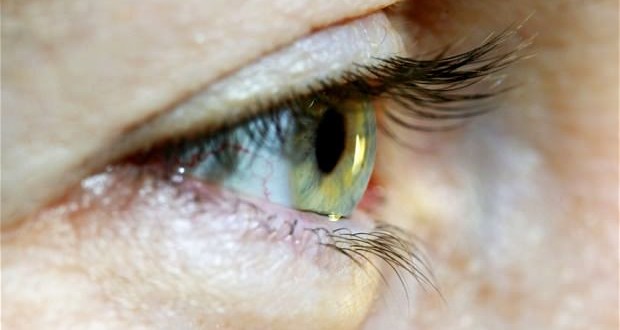Regular eye tests could in future be used to diagnose early-stage Alzheimer’s, research suggests.
Early trials of two techniques show that a key Alzheimer’s biomarker can be identified in the retina and lens of the eye.
Both methods were able to distinguish between probable Alzheimer’s patients and healthy volunteers with a high level of accuracy.
Further work could see such tests used as a first step in identifying individuals with Alzheimer’s.
In separate studies on the connection between dementia and sense of smell, teams of researchers found that a decreased ability to detect odors in older people, as determined by a common scratch-and-sniff test, could point to brain cell loss and the onset of dementia.
In two other studies, researchers showed that noninvasive eye exams also might offer a way to identify Alzheimer’s in its early stages.
The findings — which were presented at the Alzheimer’s Association International Conference in Copenhagen — raise hopes that doctors could develop simple, inexpensive diagnostic tools that would hunt down reliable biomarkers of a disease that affects more than 5 million people in the United States.
Alzheimer’s is a progressive and incurable disease that begins in areas of the brain associated with memory. It is the leading cause of dementia in older people, usually striking people 65 and older. It robs people of their cognitive abilities, speech and, ultimately, their identities. Eventually, it shuts down the most basic body functions, resulting in death.
The studies are just a few of those that will be discussed during the six-day Alzheimer’s Association conference, which has grown since the nonprofit first organized the event in 1988 in Las Vegas. The conference, which became annual in 2009, brings together thousands of researchers from more than 60 countries to discuss the latest developments in detecting and treating the disease.
The four studies released were united in their search for easily detectable biomarkers for Alzheimer’s.
Scientists have long suspected a link between a person’s ability to detect odors and the slow destruction of brain cells caused by Alzheimer’s disease, particularly in the disease’s early stages.
In one trial, researchers led by Reisa Sperling in the Harvard Aging Brain Study focused on 215 clinically normal people who had no complaint of memory loss and were living in their communities. They were given the University of Pennsylvania Smell Identification Test, a packet of scratch-and-sniff panels with 40 different odors.
The participants then underwent more exhaustive mental and physical evaluation, including annual cognitive evaluations; genetic analysis of known risk factors; and brain scans using MRIs and positron emission tomography (PET).
The PET scans used an injected substance to determine the level of beta-amyloid protein deposits inside each participant’s brain. Clumps of beta-amyloid fragments, which are a distinguishing characteristic of Alzheimer’s, form plaques between brain cells and are thought to kill them.
The MRI scans measured each subject’s entorhinal cortex, which is in the brain’s medial temporal lobe near the hippocampus and plays a role in processing smell and forming short-term memories. It is also one of the first regions of the brain affected by Alzheimer’s.
What the researchers found was that people who performed poorly on the odor-identification and memory tests also showed elevated levels of beta amyloid proteins in their brains, as shown in PET scans and other tests. Their entorhinal cortexes were also thinner, which is associated with poorer memory.
Agencies/Canadajournal
 Canada Journal – News of the World Articles and videos to bring you the biggest Canadian news stories from across the country every day
Canada Journal – News of the World Articles and videos to bring you the biggest Canadian news stories from across the country every day



